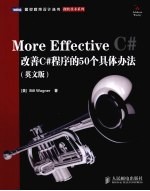

More Effective C# 改善C#程序的50个具体办法 英文版PDF电子书下载
- 电子书积分:11 积分如何计算积分?
- 作 者:BillWagner编著
- 出 版 社:北京:人民邮电出版社
- 出版年份:2009
- ISBN:9787115215109
- 页数:297 页
Chapter 1 Working with Generics 1
Item 1:Use Generic Replacements of 1.x Framework API Classes 4
Item 2:Define Constraints That Are Minimal and Sufficient 14
Item 3:Specialize Generic Algorithms Using Runtime Type Checking 19
Item 4:Use Generics to Force Compile-Time Type Inference 26
Item 5:Ensure That Your Generic Classes Support Disposable Type Parameters 32
Item 6:Use Delegates to Define Method Constraints on Type Parameters 36
Item 7:Do Not Create Generic Specialization on Base Classes or Interfaces 42
Item 8:Prefer Generic Methods Unless Type Parameters Are Instance Fields 46
Item 9:Prefer Generic Tuples to Output and Ref Parameters 50
Item 10:Implement Classic Interfaces in Addition to Generic Interfaces 56
Chapter 2 Multithreading in C 63
Item 11:Use the Thread Pool Instead of Creating Threads 67
Item 12:Use BackgroundWorker for Cross-Thread Communication 74
Item 13:Use lock() as Your First Choice for Synchronization 78
Item 14:Use the Smallest Possible Scope for Lock Handles 86
Item 15:Avoid Calling Unknown Code in Locked Sections 90
Item 16:Understand Cross-Thread Calls in Windows Forms and WPF 93
Chapter 3 C# Design Practices 105
Item 17:Create Composable APIs for Sequences 105
Item 18:Decouple Iterations from Actions,Predicates,and Functions 112
Item 19:Generate Sequence Items as Requested 117
Item 20:Loosen Coupling by Using Function Parameters 120
Item 21:Create Method Groups That Are Clear,Minimal,and Complete 127
Item 22:Prefer Defining Methods to Overloading Operators 134
Item 23:Understand How Events Increase Runtime Coupling Among Objects 137
Item 24:Declare Only Nonvirtual Events 139
Item 25:Use Exceptions to Report Method Contract Failures 146
Item 26:Ensure That Properties Behave Like Data 150
Item 27:Distinguish Between Inheritance and Composition 156
Chapter 4 C# 3.0 Language Enhancements 163
Item 28:Augment Minimal Interface Contracts with Extension Methods 163
Item 29:Enhance Constructed Types with Extension Methods 167
Item 30:Prefer Implicitly Typed Local Variables 169
Item 31:Limit Type Scope by Using Anonymous Types 176
Item 32:Create Composable APIs for External Components 180
Item 33:Avoid Modifying Bound Variables 185
Item 34:Define Local Functions on Anonymous Types 191
Item 35:Never Overload Extension Methods 196
Chapter 5 Working with LINQ 201
Item 36:Understand How Query Expressions Map to Method Calls 201
Item 37:Prefer Lazy Evaluation Queries 213
Item 38:Prefer Lambda Expressions to Methods 218
Item 39:Avoid Throwing Exceptions in Functions and Actions 222
Item 40:Distinguish Early from Deferred Execution 225
Item 41:Avoid Capturing Expensive Resources 229
Item 42:Distinguish Between IEnumerable and IQueryable Data Sources 242
Item 43:Use Single() and First() to Enforce Semantic Expectations on Queries 247
Item 44:Prefer Storing Expression<>to Func<> 249
Chapter 6 Miscellaneous 255
Item 45:Minimize the Visibility of Nullable Values 255
Item 46:Give Partial Classes Partial Methods for Constructors,Mutators,and Event Handlers 261
Item 47:Limit Array Parameters to Params Arrays 266
Item 48:Avoid Calling Virtual Functions in Constructors 271
Item 49:Consider Weak References for Large Objects 274
Item 50:Prefer Implicit Properties for Mutable,Nonserializable Data 277
Index 283
- 《卓有成效的管理者 中英文双语版》(美)彼得·德鲁克许是祥译;那国毅审校 2019
- 《程序逻辑及C语言编程》卢卫中,杨丽芳主编 2019
- 《AutoCAD 2018自学视频教程 标准版 中文版》CAD/CAM/CAE技术联盟 2019
- 《跟孩子一起看图学英文》张紫颖著 2019
- 《高等学校“十三五”规划教材 C语言程序设计》翟玉峰责任编辑;(中国)李聪,曾志华,江伟 2019
- 《改革进程中的刑事诉讼程序与证据问题研究 基于警察的视角》谢波 2019
- 《AutoCAD机械设计实例精解 2019中文版》北京兆迪科技有限公司编著 2019
- 《Java程序设计基础》罗刚 2018
- 《C++程序设计实验指导 第2版》张潇责任编辑;孟桂娥 2019
- 《复分析 英文版》(中国)李娜,马立新 2019
- 《市政工程基础》杨岚编著 2009
- 《家畜百宝 猪、牛、羊、鸡的综合利用》山西省商业厅组织技术处编著 1959
- 《《道德经》200句》崇贤书院编著 2018
- 《高级英语阅读与听说教程》刘秀梅编著 2019
- 《计算机网络与通信基础》谢雨飞,田启川编著 2019
- 《看图自学吉他弹唱教程》陈飞编著 2019
- 《法语词汇认知联想记忆法》刘莲编著 2020
- 《培智学校义务教育实验教科书教师教学用书 生活适应 二年级 上》人民教育出版社,课程教材研究所,特殊教育课程教材研究中心编著 2019
- 《国家社科基金项目申报规范 技巧与案例 第3版 2020》文传浩,夏宇编著 2019
- 《流体力学》张扬军,彭杰,诸葛伟林编著 2019
- 《指向核心素养 北京十一学校名师教学设计 英语 七年级 上 配人教版》周志英总主编 2019
- 《办好人民满意的教育 全国教育满意度调查报告》(中国)中国教育科学研究院 2019
- 《北京生态环境保护》《北京环境保护丛书》编委会编著 2018
- 《人民院士》吴娜著 2019
- 《指向核心素养 北京十一学校名师教学设计 英语 九年级 上 配人教版》周志英总主编 2019
- 《中国人民的心》杨朔著;夕琳编 2019
- 《高等院校旅游专业系列教材 旅游企业岗位培训系列教材 新编北京导游英语》杨昆,鄢莉,谭明华 2019
- 《中华人民共和国成立70周年优秀文学作品精选 短篇小说卷 上 全2册》贺邵俊主编 2019
- 《指向核心素养 北京十一学校名师教学设计 数学 九年级 上 配人教版》周志英总主编 2019
- 《中华人民共和国成立70周年优秀文学作品精选 中篇小说卷 下 全3册》洪治纲主编 2019
